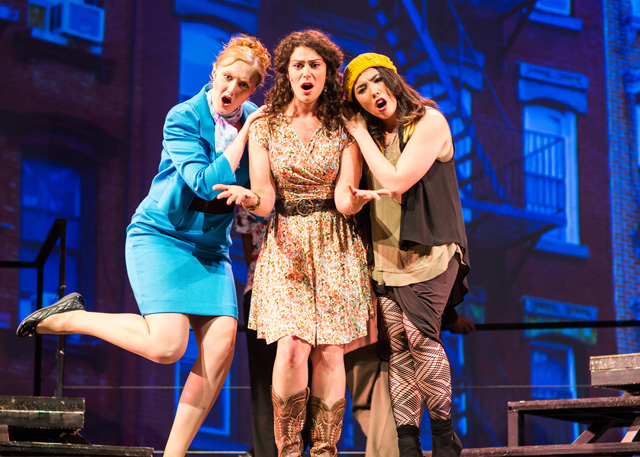
Kathy (Michelle Drexler) and Robert (Keith Pinto) in SF Playhouse’s production of ‘Company.’ (Photo: Jessica Palopoli/SF Playhouse)
Stephen Sondheim and George Furth’s 1970 musical about marriage, Company, is a product of its times. As an affable bachelor, Robert, moves through his 36th year in a blur of dinner parties with married friends and dates with women whom he doesn’t care that much about, clichés abound: The wives are crazy and spend their time making gossip; the husbands are dumb and spend their time making dirty jokes.
The American domestic sitcom was built on such stuff.
Offering alternately funny, touching or bittersweet snapshots of a bunch of marital relationships, the emotional content of Company is in many ways timeless. Sondheim and Furth’s songs, like “The Little Things You Do Together” and “Sorry-Grateful,” repeatedly bring out the crazy-making paradox of feelings people have for one another when they’re in it for the long haul.
Director Susi Damilano’s entertaining production for SF Playhouse, performed with precision and gusto by an endearing ensemble cast, certainly draws out the complexities of these human relationships throughout. Monique Hafen gives a particularly standout performance as the batty, soon-to-be-wed Amy. Hafen reels off the anxiety-choked lyrics of her character’s big number, “Getting Married Today,” with frayed brilliance, her small frame flailing jaggedly at the thought of having to walk down the aisle.  Against Bill English and Jacquelyn Scott’s stark, scaffolding-heavy set, this young woman’s pre-nuptial psychotic break feels like she’s heading to the gallows rather than to a wedding party.  The actress’s comic timing is impeccable.
Aided by joyous live music provided by a pair of pianists who toss Sondheim’s playful phrases back and forth while seated at matching baby grand pianos on either side of the stage, Damilano’s fluid mise-en-scene seamlessly connects Sondheim and Furth’s plotless vignettes. As a result, the whole show possesses an effortless swing.
Yet although the show is undeniably a good time, what this Company seems weirdly oblivious to is just how far the institution of marriage has come in this country since Sondheim and Furth penned those songs.
Back in 1970, gay and lesbian relationships simply weren’t openly depicted on the Broadway stage. (The earliest musicals with gay characters — The Faggot and the Rocky Horror Show — didn’t appear on the scene until 1973.) As such, Sondheim and Furth stuck to depicting the connubial lives of five straight couples. What’s more, they barely even touched on the piquant issues of the day that impacted many of those marriages, like women’s lib and wife-swapping.

April (Morgan Dayley), Kathy (Michelle Drexler), and Marta (Teresa Attridge) in SF Playhouse’s production of ‘Company.’ (Photo: Jessica Palopoli/SF Playhouse)
But in 2015, and in the Bay Area especially, it seems strange to experience a work of art about marriage that deals exclusively with the heterosexual kind. And Company is a musical that seems ripe for exploration beyond the realm of male-female relationships. For one thing, there’s little about the characters in this plotless work that necessitates an intrinsically straight approach. For another, as a man who did not come out as gay until he was about 40, Sondheim would probably welcome a gay, lesbian, bisexual or transgender couple or two in the mix.
The show was obviously cast long before before the Supreme Court blew open the definition of marriage last month, and in so doing changed not just the lives of people in LGBT relationships, but also touched the entire nation.
One could argue (albeit weakly) that because Damilano and her collaborators doubtless had to make casting decisions ahead of the Supreme Court ruling, how could they have known to include at least one non-hetero-normative couple on the SF Playhouse stage? But even without the blaring headlines, SF Playhouse’s straight-laced casting would have felt dated even a decade ago. Worse than that, the company has wasted an opportunity to capitalize and create commentary on one of the most pressing civil rights issues of this moment.
In his program notes, the organization’s artistic director, Bill English, asks: “Is marriage dated?” But it’s not marriage that’s dated; it’s SF Playhouse’s conception of the institution that seems to be behind the times.
UPDATE:
In an email after this review initially went live, SF Playhouse’s press representative, Anne Abrams, said that Damilano’s original concept for the show in fact revolved around “portraying the protagonist Bobby as bisexual, struggling with his sexuality, even going so far as to consider having one of the people he dates be a man to underscore his struggle.” Abrams said that when SF Playhouse approached Music Theatre International, the license holder of Company,  about making tweaks to the casting along these lines, the request “received a resounding emphatic NO.”
